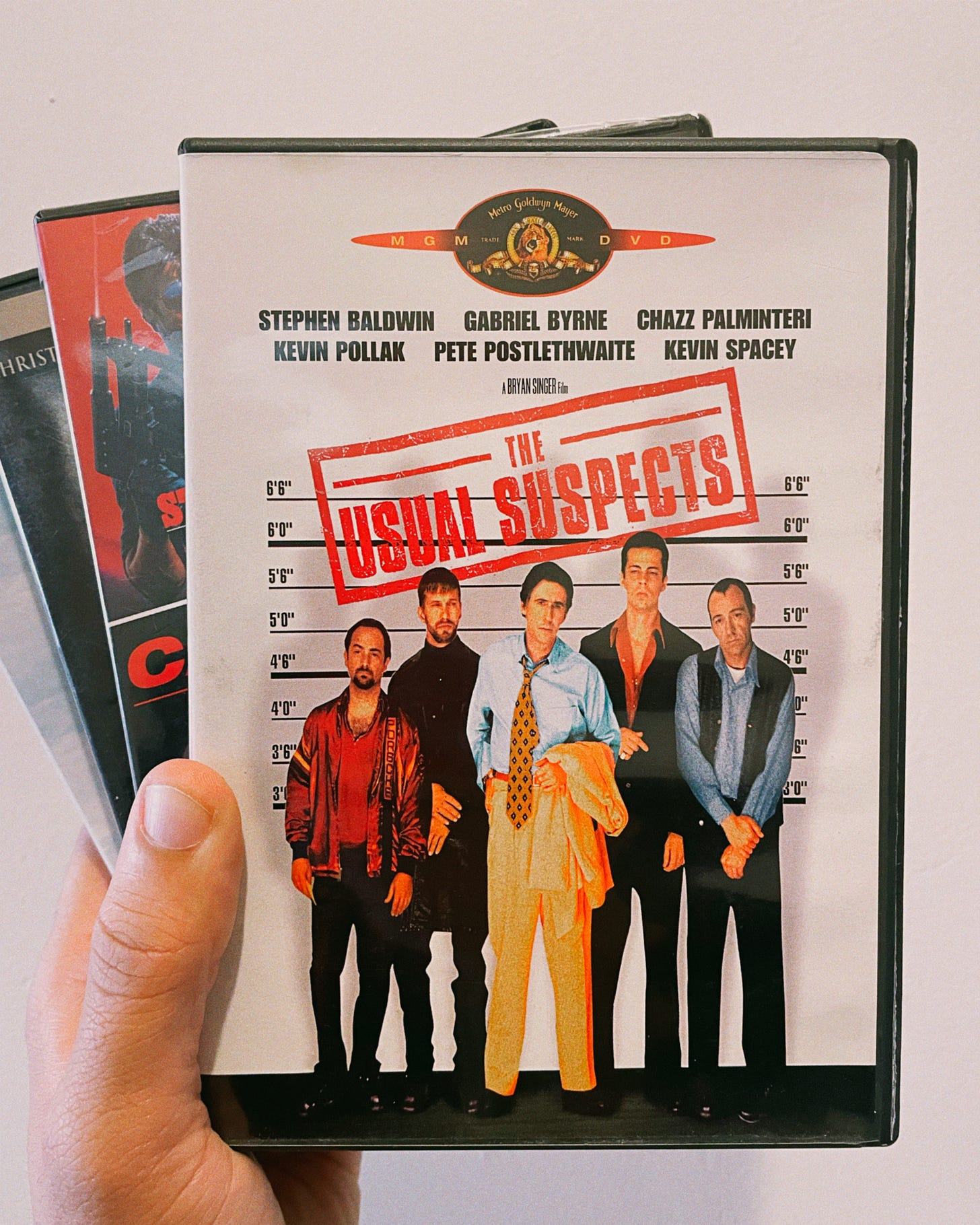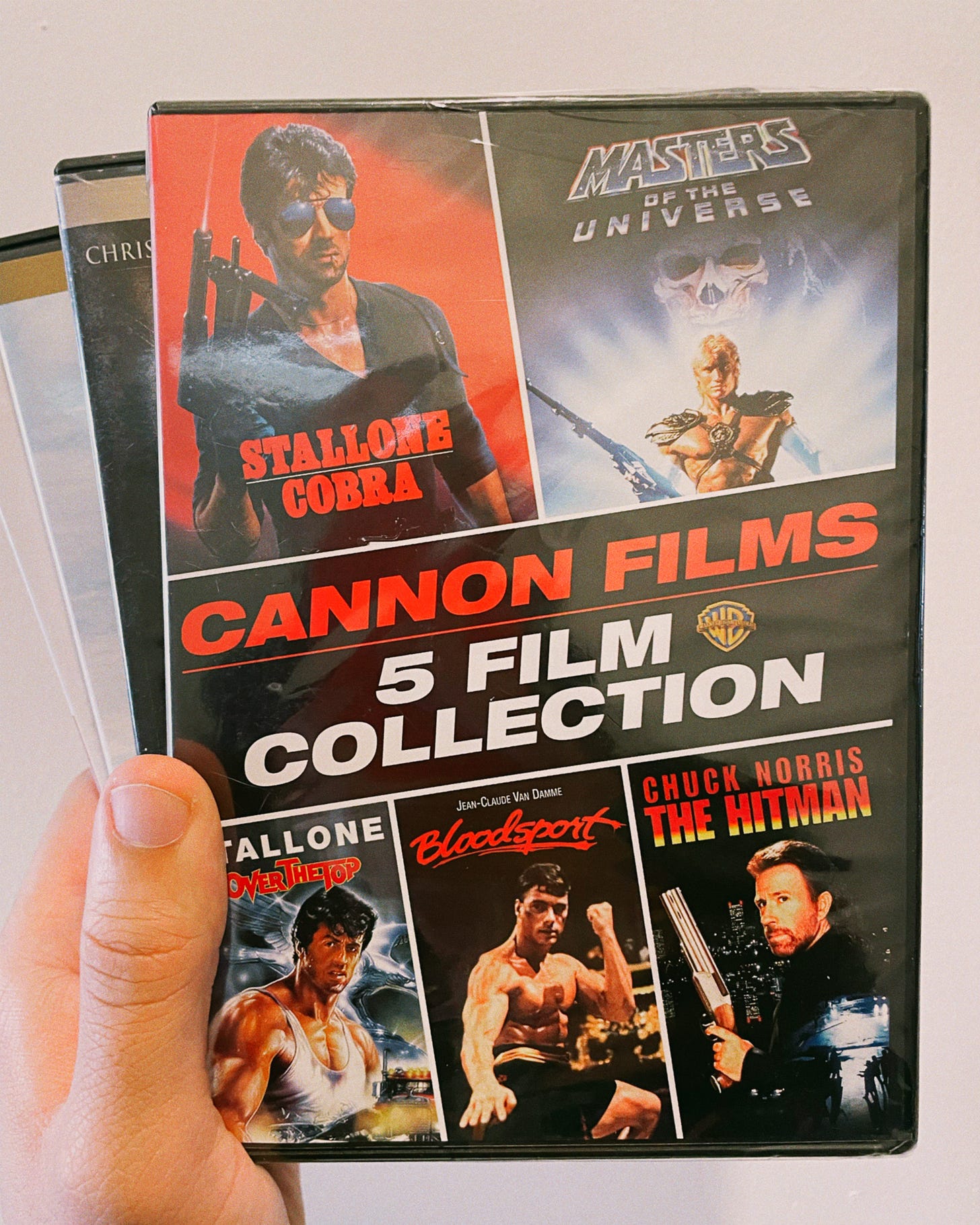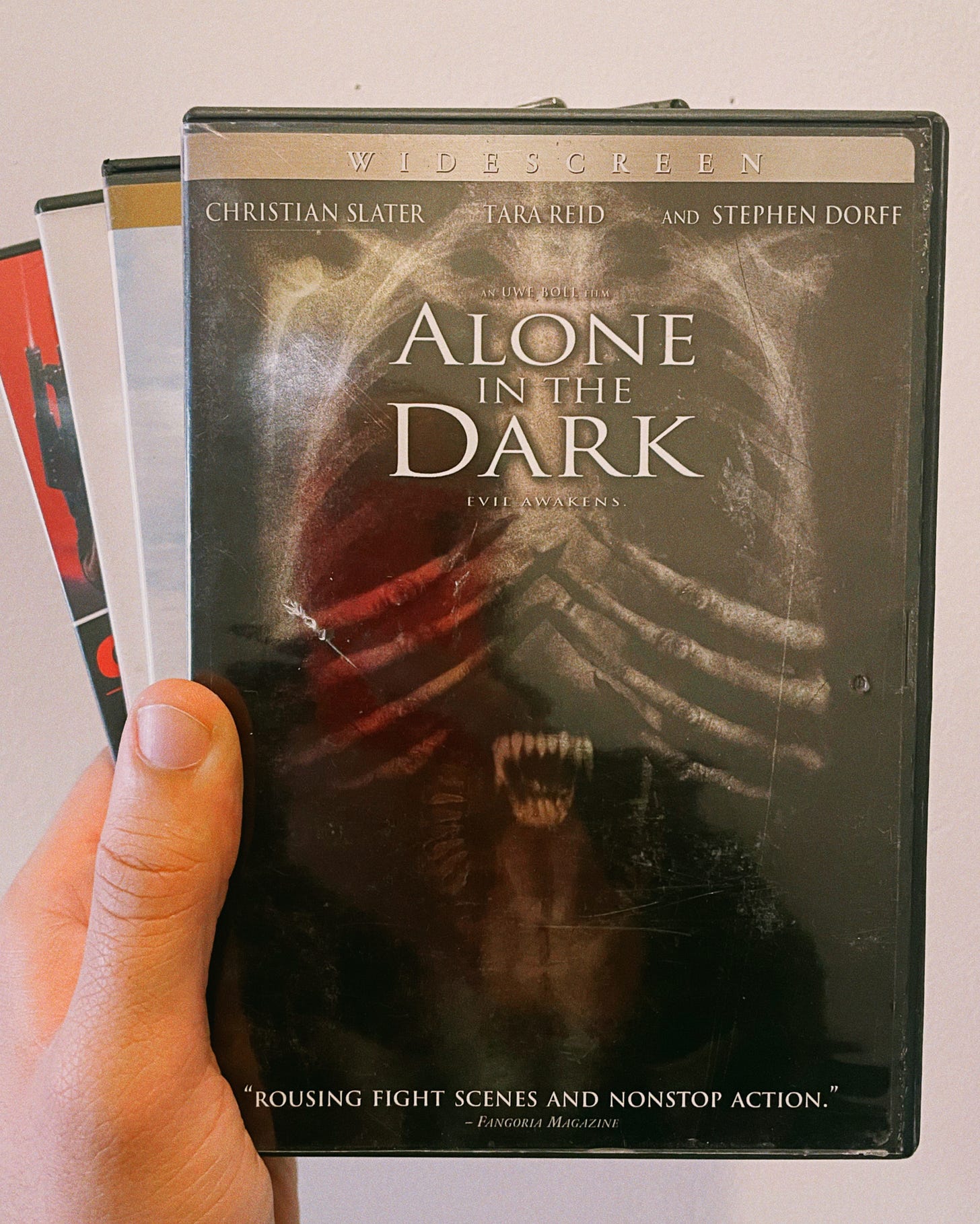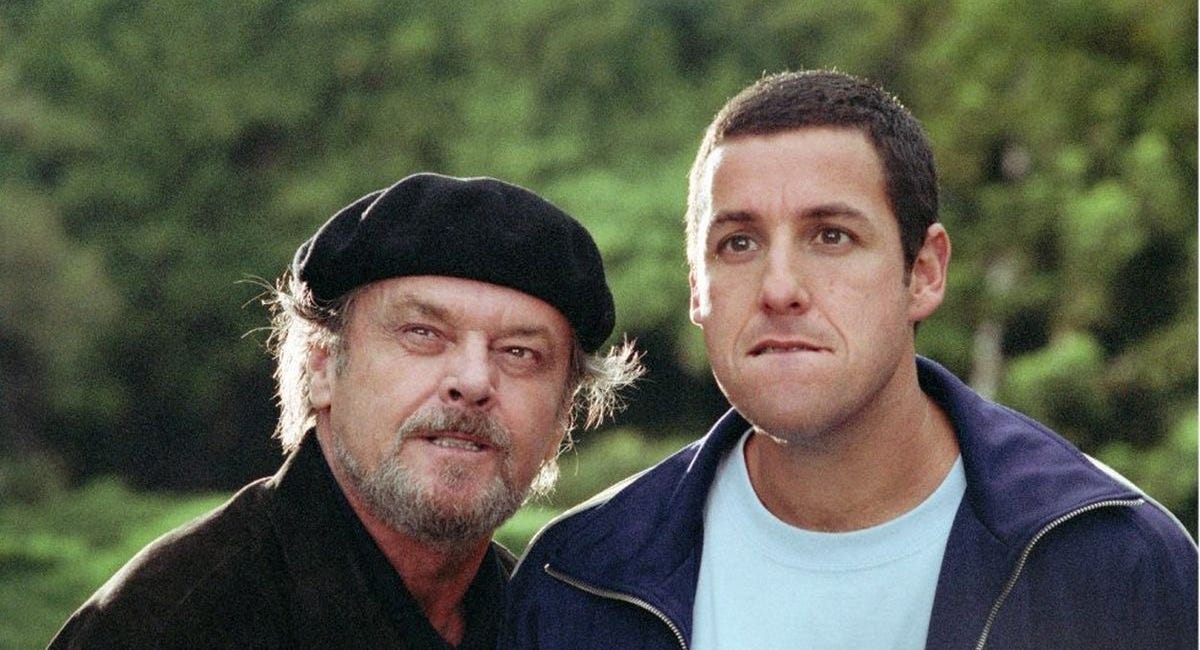
Check back for an audio recording soon.
Hey everyone,
Welcome back to Four to Go: The Weekend Watch!
With over 930 films in my library, here’s how I choose what to watch:
One I’ve seen and loved.
One that’s due for a rewatch.
One I’ve heard of but never seen.
The Blind Buy – One I’ve neither heard of nor seen.
Although I may watch more than these four films, this method guarantees I’ll have at least two movie reviews to share with you each week—and two more for us to discuss on Substack Notes.
Speaking of Notes!
I highly recommend downloading the Substack app and join our growing community.
Every Wednesday I’ll post my Weekend Watch picks on Notes, and you’ll get to vote on which two movies I review the following week!
What’s on the list this week?
The Family Man (2000)
The Usual Suspects (1995)
Cobra (1986)
Alone in the Dark (2005)
Want to help decide my next reviews? Join the conversation—download the Substack app today!
Paths Taken: The Choices That Shape Us
Double Feature No. 01
“The Family Man” (2000) and “The Usual Suspects” (1995), while these films belong to vastly different genres, they both explore themes of choice, identity, and how the narratives we construct—either for ourselves or for others—shape our lives. Let’s take a closer look.
The Family Man (2000)
Director: Brett Ratner
Genre: Romantic Comedy/Drama
Plot: Jack Campbell (Nicolas Cage) is a wealthy, career-driven executive who wakes up one day to find himself living an alternate life as a middle-class family man, married to his college sweetheart. This unexpected detour forces him to confront the choices he made in the past and reconsider what truly matters in life.
Key Themes
Choices and Regret: The film explores the “what if” scenario, showing how a single decision can lead to an entirely different life. Jack’s journey emphasizes the emotional impact of prioritizing career over personal relationships.
Identity and Self-Discovery: Jack is thrust into a life that feels alien to him but gradually discovers aspects of himself that were buried under ambition and material success.
The Value of Connection: The film highlights the fulfillment that comes from love, family, and meaningful relationships, contrasting with the emptiness of material wealth.
Why It Stands Out
“The Family Man” combines lighthearted humor with heartfelt introspection, offering a relatable meditation on the trade-offs we make and the universal question:
Am I living the life I truly want?
The Usual Suspects (1995)
Director: Bryan Singer
Genre: Crime Thriller
Plot: A group of criminals is brought together for a heist, but as the story unfolds, we learn of the shadowy figure Keyser Söze, whose influence looms over their fate. Told through the unreliable narration of Verbal Kint (Kevin Spacey), the film culminates in one of cinema’s most iconic twists.
Key Themes
Deception and Perception: The film plays with the idea that identity is often a construct, shaped by how others perceive us or how we choose to present ourselves.
Moral Ambiguity: The characters operate in a morally gray world, where trust and loyalty are constantly undermined.
The Power of Narrative: Verbal’s recounting of events manipulates both the characters in the story and the audience, underscoring how storytelling shapes reality.
Why It Stands Out
“The Usual Suspects” is a masterclass in narrative structure and misdirection. Its layered storytelling challenges viewers to question the nature of truth and how easily it can be obscured.
Connecting Themes
At first glance, The Family Man and The Usual Suspects seem entirely unrelated, but they both examine how choices and narratives shape identity:
• In The Family Man, Jack’s alternate life serves as a narrative device to help him rediscover what truly defines him, forcing him to confront the consequences of his past decisions.
• In The Usual Suspects, the entire story is revealed to be a constructed narrative, highlighting how truth can be obscured or manipulated for personal gain.
Both films also touch on identity: Jack’s journey is one of self-discovery, while The Usual Suspects presents a more sinister take, showing how identity can be a facade used to deceive others.
Why Pair Them?
The juxtaposition of a heartwarming, introspective drama with a gritty, deceptive thriller offers fascinating contrasts:
The Family Man asks: What if you could rewrite your own story?
The Usual Suspects asks: Can you ever trust the story someone else tells you?
Together, they create a dynamic exploration of the narratives we tell ourselves and others, and the consequences of those stories on our lives and identities.
Here’s a selection of films to explore these themes further.
Edge of Chaos: Heroes Against the Abyss
Double Feature No. 02
“Cobra” (1986) and “Alone in the Dark” (2005), though these films belong to different genres—80s action thriller and survival horror—they both grapple with the idea of individuals standing against forces of chaos, showcasing themes of violence, order, and the fine line between control and destruction. Let’s take a closer look.
Cobra (1986)
Director: George P. Cosmatos
Genre: Action Thriller
Plot: Marion “Cobra” Cobretti (Sylvester Stallone) is a hardened LAPD cop brought in to take down a violent, cult-like gang called the New World. The group aims to create a new society through brutal killings, and Cobra’s unorthodox, vigilante-style tactics place him at odds with both the gang and his own department.
Key Themes
Order vs. Chaos: Cobra is the embodiment of law enforcement pushed to its extreme, using violence to combat an anarchic, brutal cult. The film reflects on the necessity—and danger—of unchecked force to maintain order.
Vigilante Justice: The film explores the moral ambiguity of Cobra’s methods, questioning whether violent solutions to chaotic threats are justified.
Individual vs. System: Cobra often clashes with the bureaucracy of the police force, highlighting the tension between individual action and institutional inefficiency.
Why It Stands Out
“Cobra” is quintessential 80s action—brash, unapologetically violent, and steeped in machismo. Its stark portrayal of a world overrun by chaos and a hero willing to do whatever it takes to restore order taps into deep anxieties about societal breakdown.
Alone in the Dark (2005)
Director: Uwe Boll
Genre: Horror/Action
Plot: Edward Carnby (Christian Slater), a paranormal investigator, uncovers a supernatural conspiracy tied to an ancient civilization. As he battles creatures from another dimension and confronts government secrets, Carnby must survive against increasingly overwhelming odds.
Key Themes
The Unknown as Chaos: The film highlights fear of the supernatural as a metaphor for humanity’s inability to control or understand the unknown.
Isolation and Survival: Carnby often finds himself alone against insurmountable forces, a theme that underscores the fragility of human resilience in the face of chaos.
Science vs. Superstition: The film pits rational investigation against the inexplicable horrors of the supernatural, highlighting the tension between logic and fear.
Why It Stands Out
While critically panned, Alone in the Dark has an intriguing mix of survival horror and action. Its themes of ancient evil and paranoia tap into existential fears of humanity’s insignificance in the face of greater forces.
Connecting Themes
Despite their genre differences, Cobra and Alone in the Dark share thematic connections that revolve around the battle against chaos:
1. Order vs. Chaos:
Cobra represents a clash between anarchic, human-driven chaos (the cult) and law enforcement’s extreme measures to contain it.
Alone in the Dark focuses on chaos as a supernatural, uncontrollable force, with humanity struggling to even comprehend it.
Isolation of the Protagonist:
Both Marion Cobretti and Edward Carnby are portrayed as outsiders—lone warriors forced to confront forces larger than themselves, with minimal support from others. Cobra fights both his own police department and the cult, while Carnby battles the unknown in near-isolation.
The Thin Line Between Hero and Monster:
Both films question whether their protagonists, in their quest to combat chaos, sacrifice their own humanity. Cobra’s brutal tactics and Carnby’s obsessive drive to uncover the truth blur the line between savior and destroyer.
Survival in a Chaotic World:
Whether it’s the urban warzone of Cobra or the supernatural horrors of Alone in the Dark, both films depict worlds where survival demands extreme measures, often at great personal cost.
Why Pair Them?
These films create an intriguing dynamic by juxtaposing human-driven chaos (Cobra) with supernatural chaos (Alone in the Dark).
Together, they explore the limits of human resilience and morality when faced with overwhelming violence and disorder.
One highlights brute force as a solution, while the other delves into the fragility of reason when confronted with the unknown.
This pairing sets the stage for a broader exploration of the nature of chaos, making for a fascinating thematic discussion on the interplay between control, destruction, and survival.
Here’s a selection of films to explore these themes further.
Well folks, that’s it for this weekend. I’ll be back next week with a FILMS review of The Usual Suspects and Cobra. Until then, you can catch up with me on the Substack app, or checkout my latest FILMS review for Anger Management below. See you soon!
Anger Management: A Closer Look at Comedy, Growth, and Emotional Intelligence
Welcome back to FILMS: For Your Consideration! This week, we’re diving into Anger Management (2003), a comedy directed by Peter Segal and starring Adam Sandler as Dave Buznick and Jack Nicholson as Dr. Buddy Rydell.








